In the United States, there are three general types of electrical suppliers. They are: Investor-Owned Utilities (IOU) Municipally Owned Utilities (MUNI) Customer Owned Rural Cooperatives (Co-op) Investor-Owned Utilities include big names in Electrical & Natural Gas distribution such as Con Ed, Florida Power and Light, and Pacific Gas & Electric. These are investor-owned utilities. There Read more
Featured Articles

In the United States, there are three general types of electrical suppliers. They are:
- Investor-Owned Utilities (IOU)
- Municipally Owned Utilities (MUNI)
- Customer Owned Rural Cooperatives (Co-op)
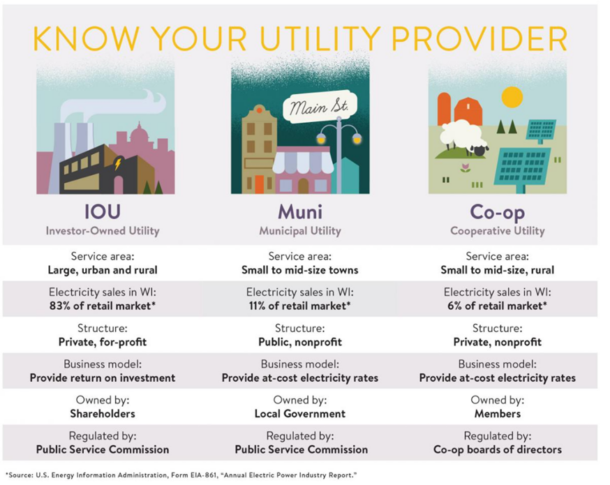
Investor-Owned Utilities include big names in Electrical & Natural Gas distribution such as Con Ed, Florida Power and Light, and Pacific Gas & Electric. These are investor-owned utilities. There are 168 IOUs in the US that serve about 110 million customers. They are regulated by their respective Public Service Commissions (PSCs) and must conform as a regulated monopoly.
Municipally Owned Utilities (there are 958 of them) include names like Rochester Public Utilities, Tampa Electric Company, and Philadelphia Gas Works. Since these utilities are owned by a municipality or another government agency, they are regulated by their owners, meaning the city or community.
Customer Owned Rural Cooperatives (there are 832 of them) include names like Texas-based Pedernales Electric Cooperative, The Nebraska Rural Electric Association, and New Jersey’s Sussex Rural Electric Cooperative. These utilities exist to bring the best services possible to their consumers, and they are run by the folks that pay also pay for the energy.
Investor-owned electric utilities are typically regulated and operate as vertically integrated monopolies with oversight from public utility commissions. They may operate in deregulated markets in which electric energy prices are set by the market and are subject to federal oversight of their wholesale market.
Before 1990, most investor-owned electric utilities were regulated and vertically integrated. That means that the utilities own electricity generators and power lines (both distribution and transmission lines). Presently about 30% of US electricity demand is serviced by these fully integrated utility markets. In much of the US, states have abandoned this system in favor of deregulation.
In traditionally regulated regions, utilities operate as a monopoly in their territories. That means that customers only have the option to buy power from them. To keep electricity rates reasonable, state regulators oversee these electric utilities and set electricity prices. Retail electricity prices are set based on the utility’s operating and investment costs alongside a fair rate of return, which is called a “revenue requirement”. This revenue is approved by the state’s public utilities commission and prevents utilities from overcharging customers for energy.
Smaller rural electric cooperatives power 56% of the American landscape, serving 42,000,000 residents, including 92% of impoverished counties.
There has been tremendous publicity for geothermal technologies. Direct use and enhanced geothermal systems are providing incredible baseload electricity and thermal energy for infrastructure. Geothermal technologies are strategically vital toward management of peak demand on the grid. The wide-spread power outages in Texas (2021) are an example of a runaway peak demand in the heating season.
“Ground Source Heat Pumps (GSHPs) are the key to managing demand on the electrical grid.”
With the high demand for air conditioning in the summertime, why would a wintertime freeze cause the electrical grid to “spike” as we saw in Texas in 2021? Most people know that air conditioning loads in the middle of August usually drive the greatest demand on the grid. However, electric heaters & air source heat pumps (ASHPs) are often used to handle peak heating loads, and they can double or triple that peak demand in the wintertime, when compared with summertime demand. Here’s a primer on how and why that is:
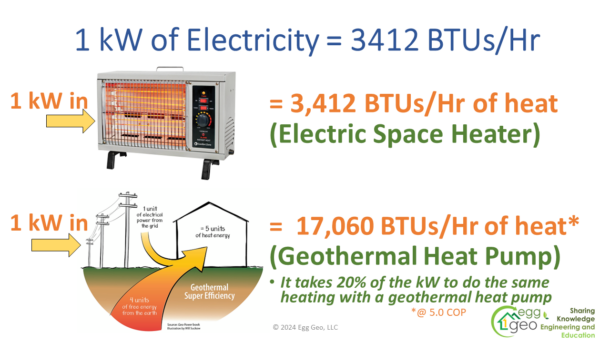
Energy Facts:
- 1 watt of electricity = 3.412 BTUs
- I kW of heat consumed by an electric heater = 3,412 BTUs of heat output
- I kW of heat consumed by an electric Geothermal Heat Pump (GHP) = 17,060 BTUs of heat*
- It takes 20% the kW to do the same heating with a GHP *(@5.0COP)
As it gets colder outside, Air Source Heat Pumps (ASHPs) must work harder to extract heat from the air. Geothermal Heat Pumps (GHPs) continue to have high efficiency operation regardless of outdoor temperature (because underground temps are reasonably stable).
Cold temperatures can reduce the efficiency of heat pumps, simply because it’s hard to extract heat from outside air as it gets colder. The efficiency of ASHPs drops as it gets colder outside, just as the gas mileage efficiency of a car drops when it’s climbing a hill. Geothermal heat pumps are not normally subject to drastic temperature fluctuations, because they’re coupled with the temperature in the shallow earth, which ranges between about 45 and 75 degrees in the US.
There have been a few Customer-Owned Rural Cooperatives (Co-ops) in recent decades that have been able to capitalize on reduced demand in summer, and increased revenue from electric GHPs in the winter. Look at the demand of two identical office buildings in Oklahoma. One has air-source heat pumps (ASHPs), the other, geothermal heat pumps (GHPs):
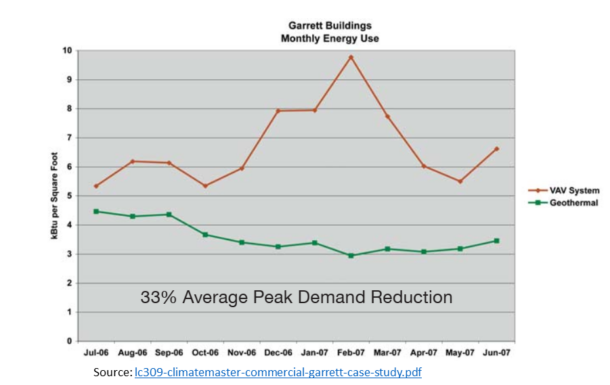
It’s obvious that there is a demand reduction in the summer, but the winter savings & peak demand reduction are remarkable. Here are some figures from Boyd Lee, an employee of CKenergy in Oklahoma:
- 2000 new GHPs replaced (both new construction and replacing gas furnaces)
- 4800kW Demand Reduction = $835,000/year.
- New sales totaled an additional 2,600,000 kWh, or about $260,000.
- Net annual increased revenue = $1,095,200.
What this means is that the electrical cooperative has more than $500 per year per home in additional income by going with a geothermal solution when compared to air sourced heat pumps. Electrical utilities typically look for payback in 60 years or less for infrastructure improvements such as power plants or distribution lines. Using that same logic, the utility has $30,000 per home to pay for the upgrades. That will more than cover the cost of the geothermal solution. And while ASHPs last 10 to 15 years, the GHP will last closer to 30 years because it can be installed all-indoors, and has a more stable heat exchange source, meaning it has much better working conditions.
Geothermal Exchangers Extract Energy from the Earth
The geothermal heat pump solution in the CKenergy case totaled 5142 Tons of capacity, and reduced demand by 0.65 kW per ton. That represents a 3.4 MW peak energy generation by the geothermal exchangers in the CKenergy case. Note that they see the geothermal exchangers as a source of energy, producing 3.4 MWs, removing that electrical load from the grid.
 Energy Poverty
Energy Poverty
1 in 4 households served by electric co-ops have an annual income below $35,000. Electric co-ops delivered 4.8% more electricity in 2022 than in the previous year.
Unlike the rest of the electric sector, electric co-ops sell most of their power — 53% — to households. Keeping rates affordable is especially important for these consumers at the end of the line. -NRECA analysis U.S. average annual residential electricity bill: $1,644
Electrical co-ops are perfectly poised to create demand side management (DSM) program setting include deep subsidies for geothermal heat pump (GHP) installations. The numbers seem to bear out a model that could allow the Co-op to pay for the entire ground loop exchanger and offer “on bill financing” for the GHP, electrical, and distribution upgrades needed. With 92% of persistently impoverished communities paying energy bills to electrical cooperatives, these are the folks that could truly benefit with some relief from high energy costs. The cure to energy poverty can be partially met through this demand side management since their energy bills will be drastically reduced with GHPs.
What’s next? We will see electrical co-ops begin to take advantage of this remarkable opportunity, and millions of geothermal heat pumps will be installed over the next 20 years in cooperative communities. As these cooperatives begin to understand the demand side value of GHP’s, they will embrace the opportunity to utilize the energy source that is the earth for heating and cooling within their service areas.
 Jay Egg is a geothermal consultant, speaker, writer, and the owner of Egg Geo. He has co-authored two textbooks on geothermal HVAC systems published by McGraw-Hill Professional. He can be reached at jaye@egggeo.com.
Jay Egg is a geothermal consultant, speaker, writer, and the owner of Egg Geo. He has co-authored two textbooks on geothermal HVAC systems published by McGraw-Hill Professional. He can be reached at jaye@egggeo.com.
 Mimi Egg is a social media marketing professional, writer and media technical consultant for Egg Geo, focused on building online connections and educating on social media platforms. Her desire to educate the rising generation about green, sustainable living is a major focus in her career. Egg may be reached at mimieggshell@gmail.com
Mimi Egg is a social media marketing professional, writer and media technical consultant for Egg Geo, focused on building online connections and educating on social media platforms. Her desire to educate the rising generation about green, sustainable living is a major focus in her career. Egg may be reached at mimieggshell@gmail.com

https://vimeo.com/1029812860 On this Mechanical Hub weekly update, we’re on the road in Elkhart, Indiana to celebrate NIBCO Inc.’s 120 years in business, and another huge surprise from that event. I’ll update you on our latest podcasts, and a partnership worth sharing Read more
On this Mechanical Hub weekly update, we’re on the road in Elkhart, Indiana to celebrate NIBCO Inc.’s 120 years in business, and another huge surprise from that event. I’ll update you on our latest podcasts, and a partnership worth sharing.

Elkhart, Indiana-based NIBCO Inc. celebrated in style this week as esteemed guests were invited to dinner, drinks and dancing in what was a wedding reception-like ceremony that included a multi-piece band. The following day, invitees were treated the ribbon cutting of the new Rex Martin NIBCO Interactive Museum, and took the tour. The museum offers Read more
Elkhart, Indiana-based NIBCO Inc. celebrated in style this week as esteemed guests were invited to dinner, drinks and dancing in what was a wedding reception-like ceremony that included a multi-piece band. The following day, invitees were treated the ribbon cutting of the new Rex Martin NIBCO Interactive Museum, and took the tour.
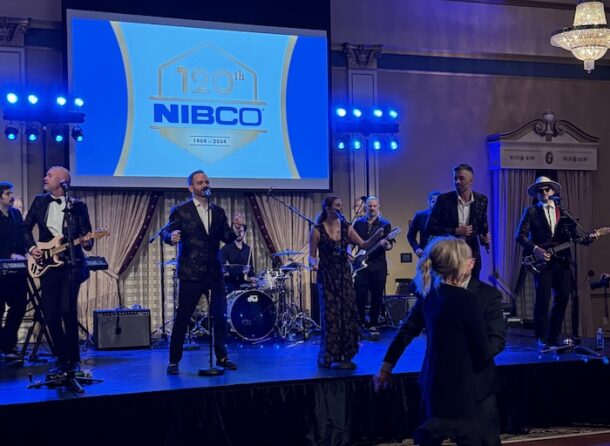
The museum offers a unique and enriching experience from a historical perspective, interactive learning, inspiration, community impact, and career opportunities. Not just a place to learn about the past, it’s a place to get excited about the future of plumbing and the opportunities it holds.
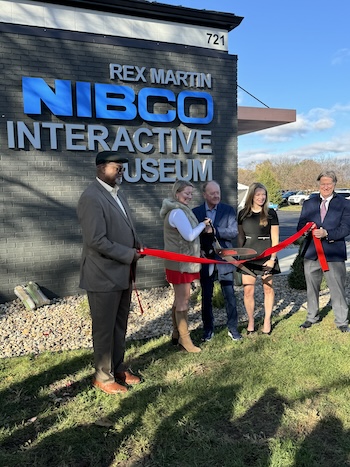 “Our decision to build the NIBCO Interactive Museum and name it after my father is a tribute to his remarkable contributions to the plumbing industry and a continuation of a legacy that began with my great-great-grandfather in 1904,” said NIBCO’s President and CEO Ashley Martin. “This ambitious project was something I wanted to complete and dedicate on NIBCO’s 120th anniversary to make it extra special. The museum is not just about preserving our history; it’s about showcasing the profound impact we’ve had on the evolution of plumbing and our philanthropic efforts within the community.”
“Our decision to build the NIBCO Interactive Museum and name it after my father is a tribute to his remarkable contributions to the plumbing industry and a continuation of a legacy that began with my great-great-grandfather in 1904,” said NIBCO’s President and CEO Ashley Martin. “This ambitious project was something I wanted to complete and dedicate on NIBCO’s 120th anniversary to make it extra special. The museum is not just about preserving our history; it’s about showcasing the profound impact we’ve had on the evolution of plumbing and our philanthropic efforts within the community.”
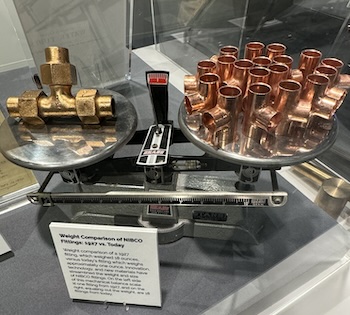 Martin continued, “I want our NIBCO associated, our customers, local school kids to be able to come here and use this so it needed to be interactive. We also highlighted plumbing: where our products go, how they bring water to you, take waste away, but it also highlights our four manufacturing processes—plastics, copper, bronze and iron.”
Martin continued, “I want our NIBCO associated, our customers, local school kids to be able to come here and use this so it needed to be interactive. We also highlighted plumbing: where our products go, how they bring water to you, take waste away, but it also highlights our four manufacturing processes—plastics, copper, bronze and iron.”
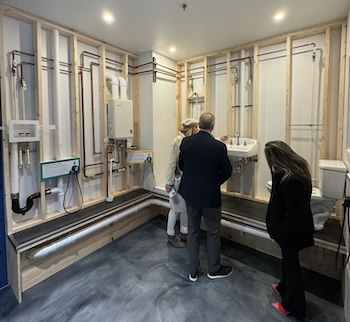
The museum offers a unique and enriching experience from a historical perspective, interactive learning, inspiration, community impact, and career opportunities. Not just a place to learn about the past, it’s a place to get excited about the future of plumbing and the opportunities it holds.
Artifacts, representing various aspects of the history of plumbing, as well as the history of NIBCO, are exhibited throughout the museum, including:
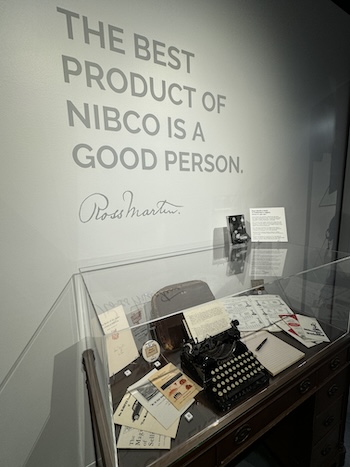
- Early foundry tools
- Original crown jewels of NIBCO
- Original early fittings including the first fitting from 1927 and early valves
- Original product blueprints from the 1930s
- Items from Lee Martin’s collection
- Original printings of Ross Martin’s collection of booklets
- Philanthropic contributions
- Collectibles and promotions
The 8,845-square-foot building was completely renovated beginning in 2023. The museum portion of the space is 3,254 square feet, and additional space in the building will be used as a training area for customers, distributors, and NIBCO associates.

https://vimeo.com/1027108697 On this update, we’ll talk PFAS, our podcasts where on the Make Trades Great Again, Eric and Andy shift from shop talk to van talk, and on the Appetite for Construction podcast, Tim and John talk with Ryan Shikhman about Trades Over College, and we update you on what’s trending on social media the Read more
On this update, we’ll talk PFAS, our podcasts where on the Make Trades Great Again, Eric and Andy shift from shop talk to van talk, and on the Appetite for Construction podcast, Tim and John talk with Ryan Shikhman about Trades Over College, and we update you on what’s trending on social media the past few weeks.

https://vimeo.com/1025087361 We hope you all had a great Halloween with plenty of little visitors dressed up in their most creative costumes. This week we’ll talk presidential election, where the race for the White House is certainly heating up. Key battle ground states are still undecided. If you haven’t already, get out and vote. Election day Read more
We hope you all had a great Halloween with plenty of little visitors dressed up in their most creative costumes. This week we’ll talk presidential election, where the race for the White House is certainly heating up. Key battle ground states are still undecided. If you haven’t already, get out and vote. Election day is next Tuesday.

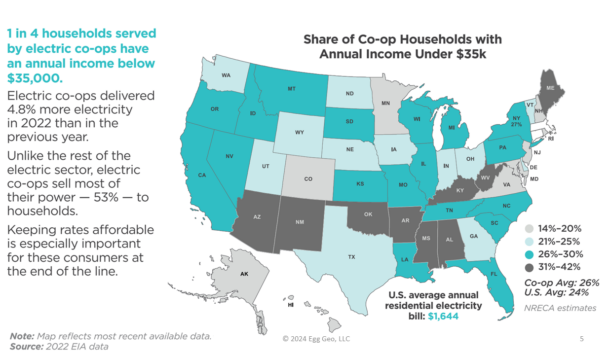 Energy Poverty
Energy Poverty